Hello! On this week’s guest blog, we are your featured writers, Emily (Sean and Vivian’s oldest daughter) and Whitney (her girlfriend).

We visited the Foleys in Singapore last month and are here to share our experiences from our trip. For both of us, this trip was our first time on the continent of Asia; we visited Singapore for 13 days, with a week-long hop over to Thailand in the middle of our visit. We had a blast experiencing the culture of this blended society, eating the delicious and affordable culinary delights available, and spending quality time with our family, as Sage also visited Singapore for the first part of our trip.
Arrival
We began our trip at the Kansas City Airport at 6 a.m. on Tuesday morning. A brief flight to San Francisco, a sprint through the San Francisco Airport with a short hour layover, and we were on our 17-hour flight to Singapore full of movies and attempts to sleep. When we deplaned, it was already 8 p.m. on Wednesday and we weren’t quite sure when or where time even existed. Vivian met us past immigration and suggested we walk over to the Jewel, Singapore Changi Airport’s very own man-made waterfall. We arrived just in time to catch the end of a light show projected on the waterfall, then headed home via two buses where we collapsed into bed.
Tagging Along for Daily Life
One of the best parts of our visit was getting time to spend with Mom and Dad. Not only was it good to see them in person after months of video and phone calls, but it was interesting to be with them in a part of town that tourists don’t often visit. During our time in Singapore, we got to go grocery shopping, spend time in Yishun Emerald condominium accommodations, and visit the office that the Foleys are working out of during their mission.
Sean and Vivian go grocery shopping once a week and we went along twice during our visit. Just shopping in a big city without a car would be enough of an adventure for these Midwestern suburban girls, but grocery shopping in Singapore is a whole new world. We walked to a market, shopping roller bags in tow, where fresh tropical fruits and baked goods are available. Because Singapore is so hot, even early in the morning, the sun is already cooking both the goods and the people, but it’s always exciting to see unfamiliar fruits like dragon fruit and rambutans, and we’re told that fresh mangos and watermelon are available year-round. Then we headed over to the grocery store located in the bottom floor of the closest mall. The grocery store is crowded and chaotic, with people giving out samples and hollering on microphones about their promotions mixed in to the regular crowd of shoppers and employees. The stores only provide baskets, no shopping carts, and they also charge for bags, so most people are dragging their own shopping roller bags around the store. The stores have all the staples, but it's fun to explore the different varieties, whether that be strange KitKat and chip flavors, the overabundance of Milo, an Australian chocolate drink similar to Yoohoo, or seeing the many countries where everything came from (since Singapore is so small, it doesn’t produce a lot of its own goods). Emily was very interested to read all the countries of import. Much of the produce was from Malaysia, Indonesia, China, or Thailand. However, there were also some unexpected ones, such as cereal from Poland. After the shopping was done, we loaded our groceries into our roller bags and took the bus home.
Sean and Vivian’s condo is very nice with friendly neighbors and pleasant décor including a butterfly motif. We enjoyed an evening swim nearly every night that we were there to wash off the sweat from the day. They have a very nice, large pool and we were surprised that many people seemed to prefer sitting around it to swimming as there were usually only one or two other swimmers while we were there. The pool water temperature was pleasant every day, though when the outside temperature dropped to a brisk 86 degrees, the locals did comment to us that the water must be “freezing” as it was “so cool out” that night. There is a hot tub available as well, but we’re not sure why anyone would be interested in warm water in the Singapore temperature and humidity (we did see people there, and good for them, live your best life). We also popped into the karaoke room one night to sing along to some Taylor Swift tunes and enjoyed a cup of fresh Australian orange juice from a vending machine. We saw juice vending machines all over with oranges stocked in the top. When you purchase a cup, the machine squeezes the oranges right there for you and the freshness tastes wonderful. Emily also liked that you get the orange pulp. Whitney wondered how they keep the oranges fresh.
If you know Sean and Vivian, and we’re assuming you do, you know that they are game people, so of course we entertained ourselves with a few rounds of Dutch Blitz most nights. Emily had a run of good luck with a couple of wins, but just about everyone had their turn on a winning streak.
Finally, we also were able to visit Sean and Vivian’s office at the church where they have their meetings and counseling sessions. We also went to two linger-longers after church on the two Sundays we were there. One of the meals was Tex-Mex (just what we were hoping to try in Asia 😉) and the other was bibimbap, a Korean rice bowl where you could add whatever meat and veggies you wanted (such as Mom’s beautiful julienned cucumbers), plus a spicy chili sauce that we went very light on. We were able to meet the YSA ward members that Sean and Vivian go to church with and learned a lot from the native Singaporeans and transplants to the area.
Infrastructure, Singapore-style
No blog post about Singapore would be complete without a comment on the infrastructure of this city/country. Singapore’s founder once remarked that Singapore’s success was in large part due to installing air conditioning everywhere. The trains and buses are all air conditioned as is nearly every public place except, somewhat surprisingly, bathrooms. (Sidenote: I think if there is one place I want air conditioning, it’s the bathroom. Buildings that are otherwise air conditioned often have only windows for air flow in their bathrooms, and sweating while using the facilities is a lot like using the bathroom in a wet swimming suit: not that fun.) While you’re hot outside every moment of every day, inside spaces are more comfortable and it is always a relief.
The center for community in Singapore seems to be the mall. Everywhere is a mall. Seriously – there are few stand alone buildings, most of those places of worship. Other than that, basically every building is a high rise full of apartments, a mall full of stores, or a mix of the two. As mentioned, the grocery stores are in the basements of malls; restaurants, retail, fast food, and even libraries are also in malls, making them the place to be. At first, it was a wonder that malls have survived in Singapore when they have died in American society, but then it hit us: air conditioning. You have to stay inside if you’re going to be somewhere a while. That combined with Singapore’s small size means they have to make the most of their space, and so the mall thrives.
Getting around is easy in Singapore. There seems to be some intuitive structure to how the public transportation and building layout is planned. Whitney is notoriously bad at following directions, even as the GPS clearly hands them out, but she easily traversed the city and even found alternate routes. The public transportation, while often crowded, is quick, affordable, and as comfortable as can be. We find it fun to take public transportation since we don’t have much access at home, and trains feel like an adventure when you’re used to having to drive yourself everywhere. The transfers between different train lines and buses are easy and the cost of the fare carries over. Trains come every few minutes making wait times easy and reducing the stress that you just missed the last train; don’t worry, another one is coming shortly. Singapore had the cleanest, best-smelling, and best environment of public transportation we’ve used when compared to Paris or London or Rome. But to achieve this, Singapore does have strict rules. There is a $500 fine for eating and drinking on the trains or even in the train stations, which fair enough, but it’s hard to stop yourself when carrying a water bottle and absentmindedly taking a sip. The YSA members assured us that we wouldn’t be fined for a quick sip of water, which helped the paranoia. Additionally, there is no fine for it, but durians are forbidden on public transportation (too smelly!). I guess you have to eat it right away or get a rideshare to get them home.
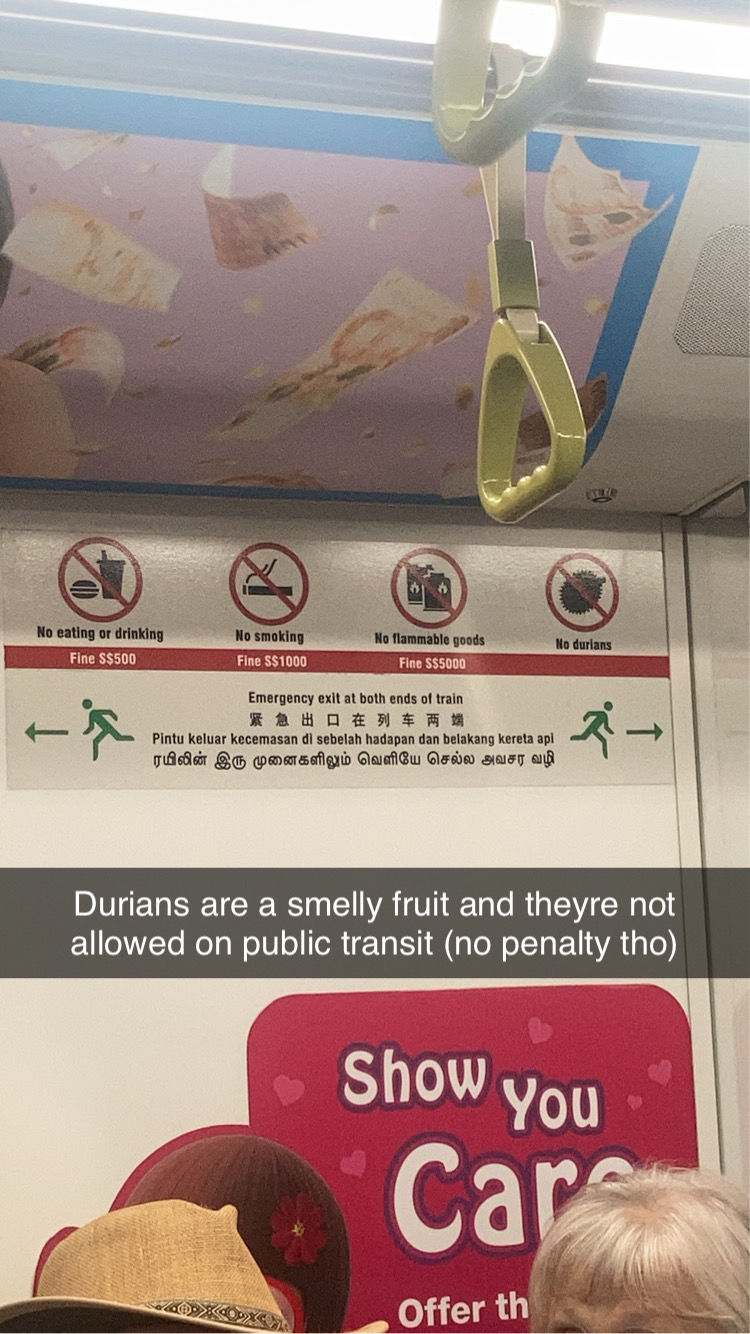
The Greening of a City
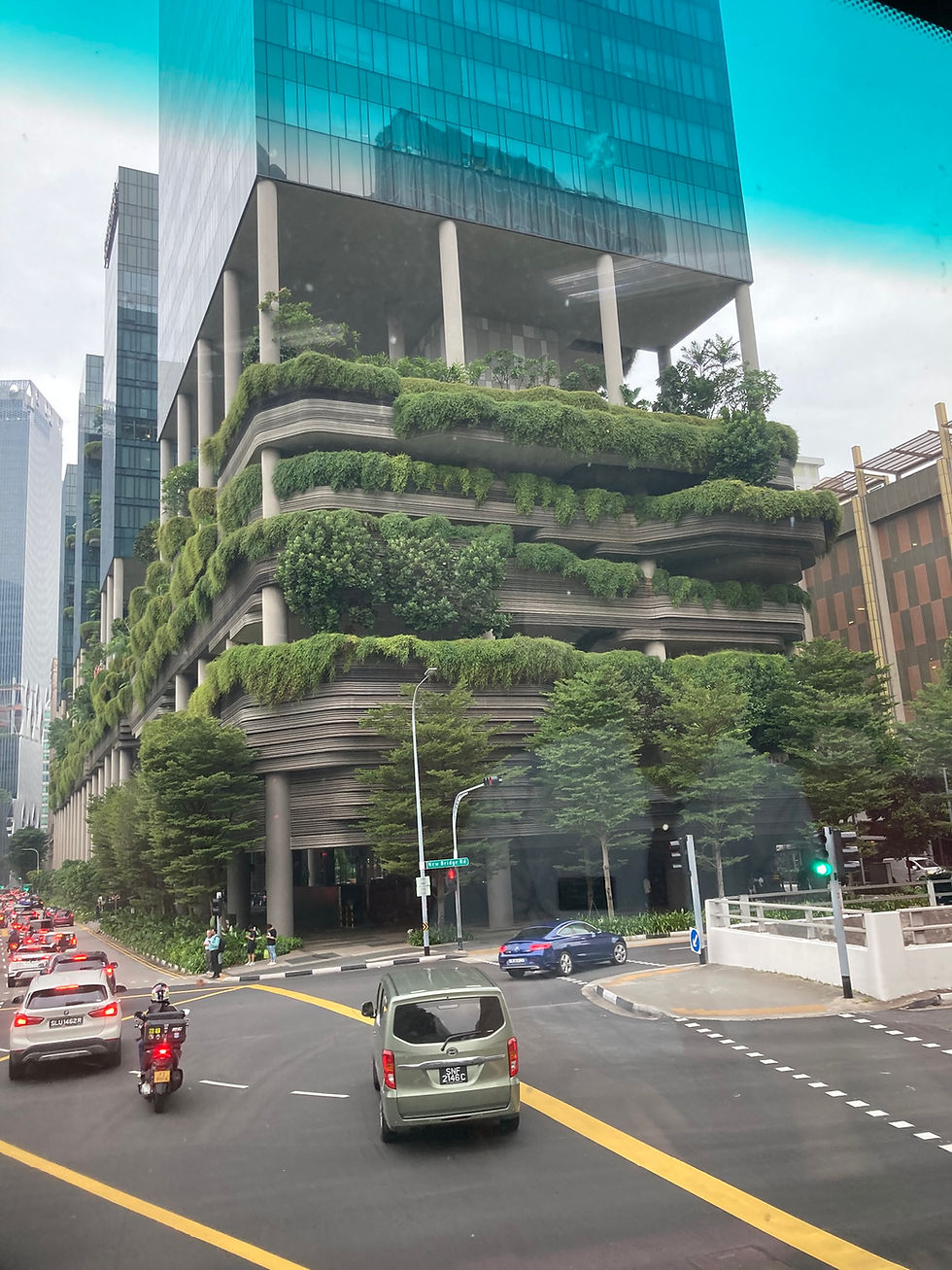
We are very passionate about the environment in our daily lives. We keep our house warm in the summer and cold in the winter, have biweekly compost pickup from our house, and take our own to-go containers to restaurants to help do our part. So, we were very interested and impressed with how Singapore works to take care of the environment. They are a densely populated city on a small island, so they have minimal space. Still, they prioritize parks and green spaces in the city and have requirements for buildings to have a certain amount of plant life throughout. You can see buildings draped with vines, flowers, and trees on every block and the roofs of bus stops are full of plants.
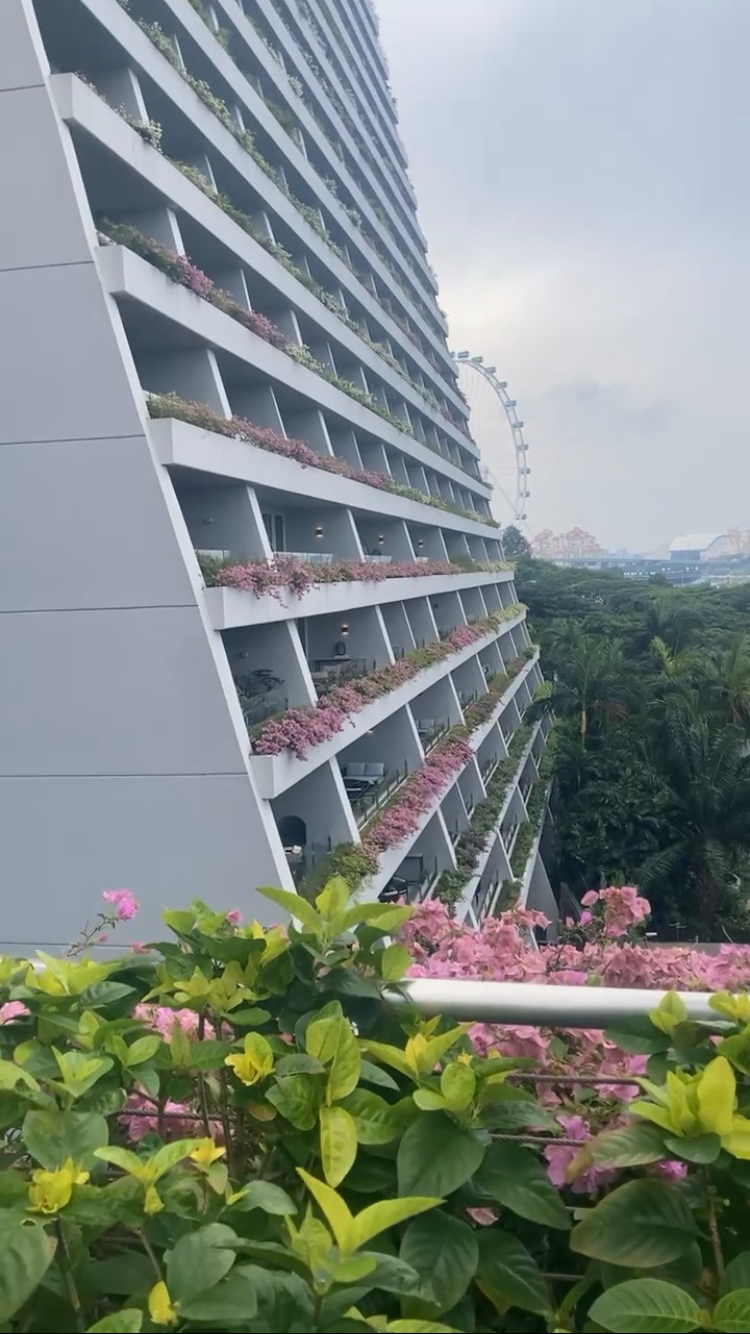
Singapore is also committed to water independence and is currently working toward maintaining their own eternal water supply. To this end, all the toilets allow you to adjust the flush capacity of each flush according to need. There are also bidets in many public bathrooms.
Near Chinatown, we visited a city museum called the Singapore City Gallery. There are interactive exhibits here that allow you to see the history of the city, the thoughtful development that has gone in to serving the citizens and tourists of Singapore, and the plans for the future. The museum has displays on topics such as water treatment, desalination efforts, and waste disposal including incineration and a landfill island as well as interactive games to let people examine and compare their consumption and waste habits with suggested tips (turn off your air con when not home, donate soon-to-expire food you're not likely to consume). The city also hopes to have a train or bus stop within 10 minutes’ walk of anywhere in the city. Now, this museum is definitely a celebration of the city and a bit of a bragging campaign from the government, but hey, might as well advertise all your accomplishments, plus the museum is free and air conditioned.
Singapore does have improvements to be made still. For instance, most of the time when you order a to-go drink, they put it in a plastic bag/handle. This does allow for convenient carrying, but feels like a huge waste of single-use plastic.
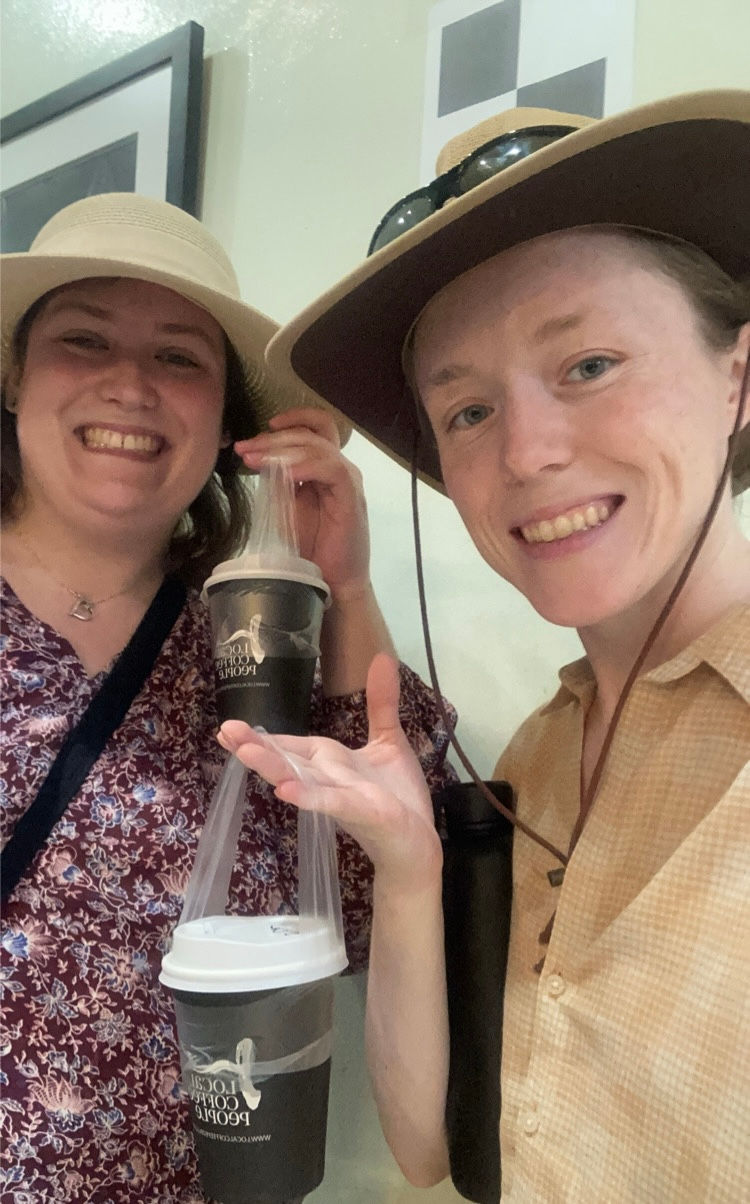
It was also interesting to compare Singapore’s efforts with Thailand’s. In Thailand, especially in Phuket where we were, there is a lot of concern about garbage due to the huge number of tourists they see, and thus a big focus on composting and recycling. On the other hand, in Singapore, we saw very few food waste bins or composting efforts, and not much in the way of street-side recycling bins either.
Natural Singapore
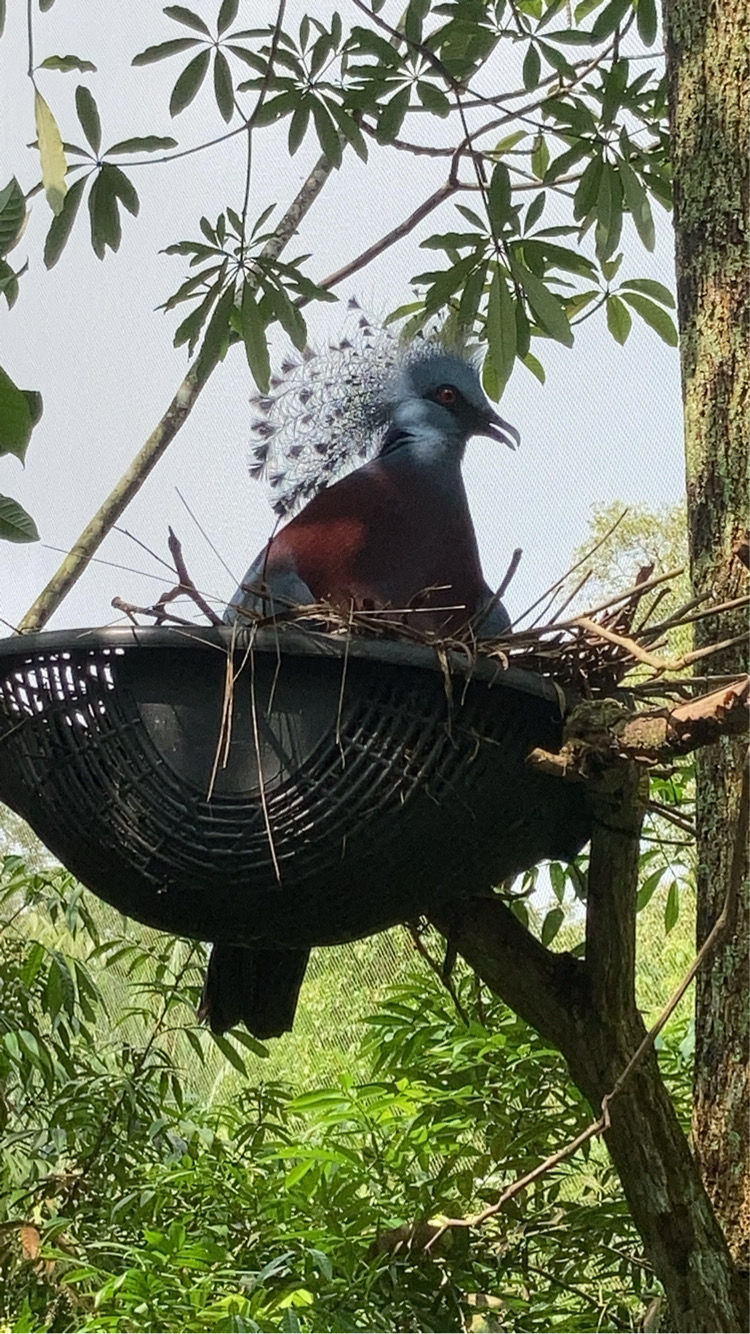
The first thing you should know about Singapore’s nature situation is that they have four (!) zoos. This is a country that is half the size of Rhode Island. Their four zoos are: The Singapore Zoo, River Wonders, Bird Paradise, and Night Safari. We went to the latter two during our visit and would have gone to the others had we had more time. Bird Paradise is a zoo for birds only, and if you like birds, it truly is a paradise. There are 12 zones featuring the birds of various regions in the world including: Africa, Asia, the Amazon, wetlands, Papua, and a special area just for penguins! They also have two free shows we attended: Wings of the World and Predators on Wings (we definitely recommend the second one, a vulture flew inches over Whitney’s head). There were also two different flamboyances of flamingos (Whitney’s favorite bird) – one in Asia (whiter in color) and one in the wetlands area (North American variety, pinker in color), so that’s always a win!
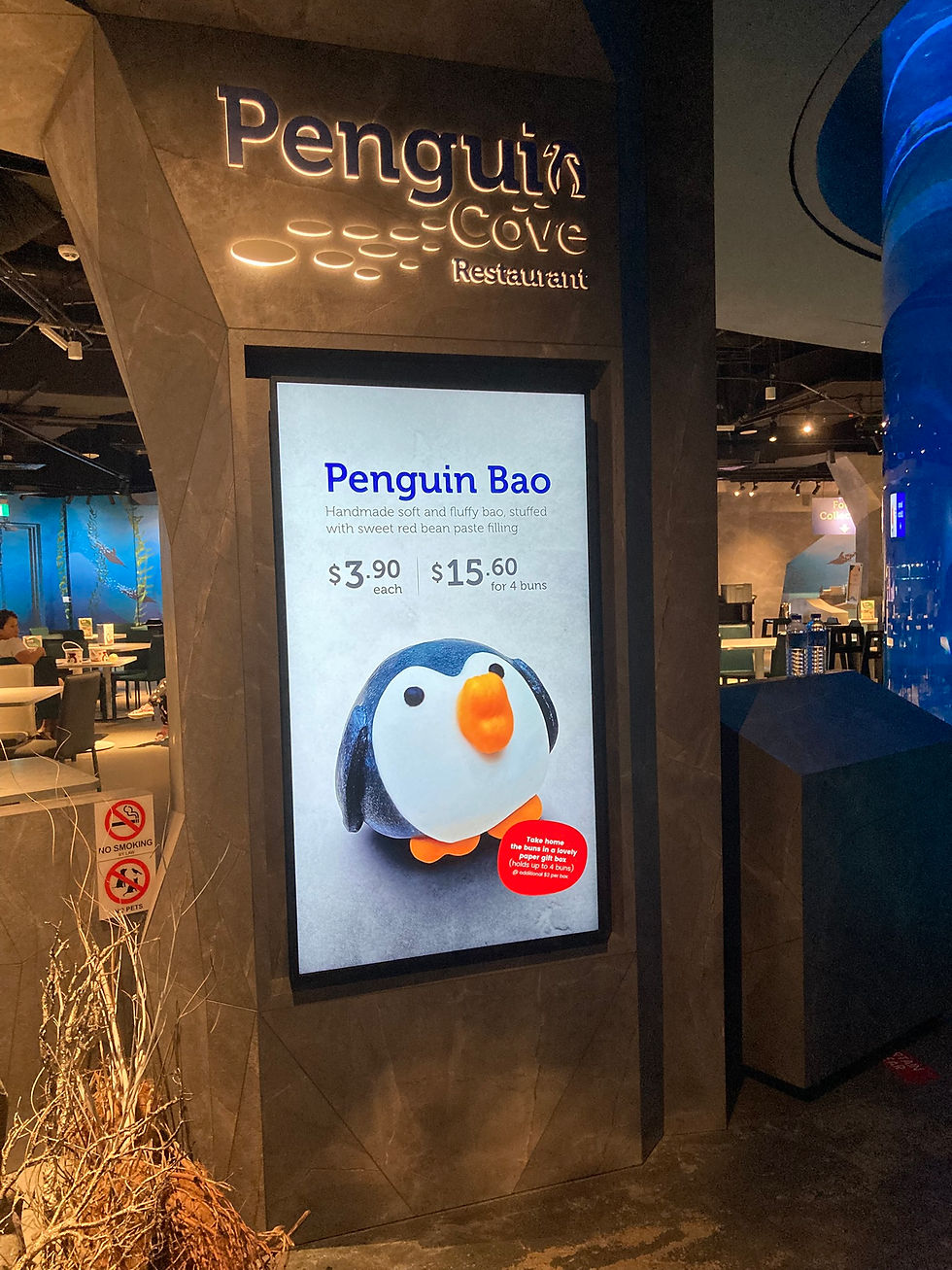

As for the Night Safari, what a cool idea! Many animals are nocturnal and if you only visit zoos during normal operating hours, those nighttime creatures just sleep. The Night Safari is open 6 p.m. to midnight and does a good job of allowing you to see the animals while keeping it dark enough for them to go about their normal lives. The show by the front gates is a fun introduction to the zoo and included an adorable fennec fox (another favorite of Whitney's) scurrying around the stage. We then took the tram around the zoo which showed off some of the main features including sleeping lions, roaming elephants, and many varieties of deer prancing around. We then wandered around the park and explored even more night animals including a romp of playful river otters tumbling over each other, a rhino getting its nighttime meal, and a few Tasmanian devils who we discovered get the zoomies at night and were indeed angelic in their dashes across their habitat. Overall, both zoos were highlights of our trip.
We also explored the rest of nature in Singapore including a boardwalk through a mangrove forest and a nature trail with many signs warning us not the feed the macaques and not even to carry plastic bags because they associate them with food. We are rule followers, but we discovered a troop of macaques just hanging out on the walking trail, so we took a moment to watch them climb trees, play and fight over food, hang on the underside of their mother’s bellies, and nurse. We respected their space, but it was surreal to see these primates just chilling uncaring of the humans navigating around them.

Finally, we also took a day trip to Pulau Ubin, one of the last rural areas of Singapore. The island used to be a granite quarry, but once abandoned, the former quarries filled with rainwater. The government decided the new rainwater “lakes” were a good opportunity to establish wetlands for wildlife. It has since has transitioned into a destination for camping and biking. We took two buses for an hour and a half each way to arrive at the dock, then a bum boat across a small straight to the island where we explored, enjoying the interesting tree trunks, unique flowers, and butterflies and birds zipping around. We went up a hillside walk that provided a beautiful view of the island’s lakes as well as a view of Singapore in the distance.

The Food Scene
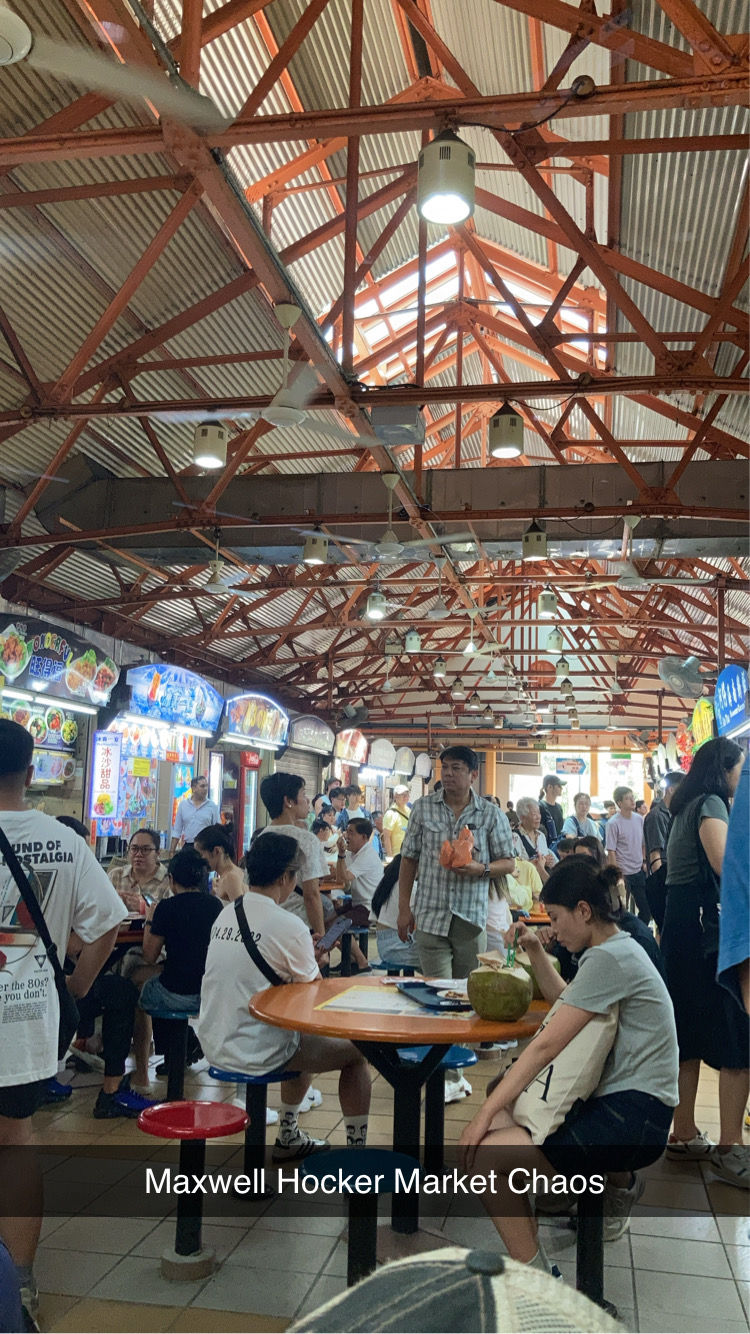
The real draw of Singapore is the food. I’m happy/sad to report that after trying authentic Asian food in Asia, we realized that we actually have excellent and authentic Asian food options here in the States. Still, the food in Singapore, with so many influences from Malaysia to India to China to Thailand and beyond, allows culinary delights to never stop.
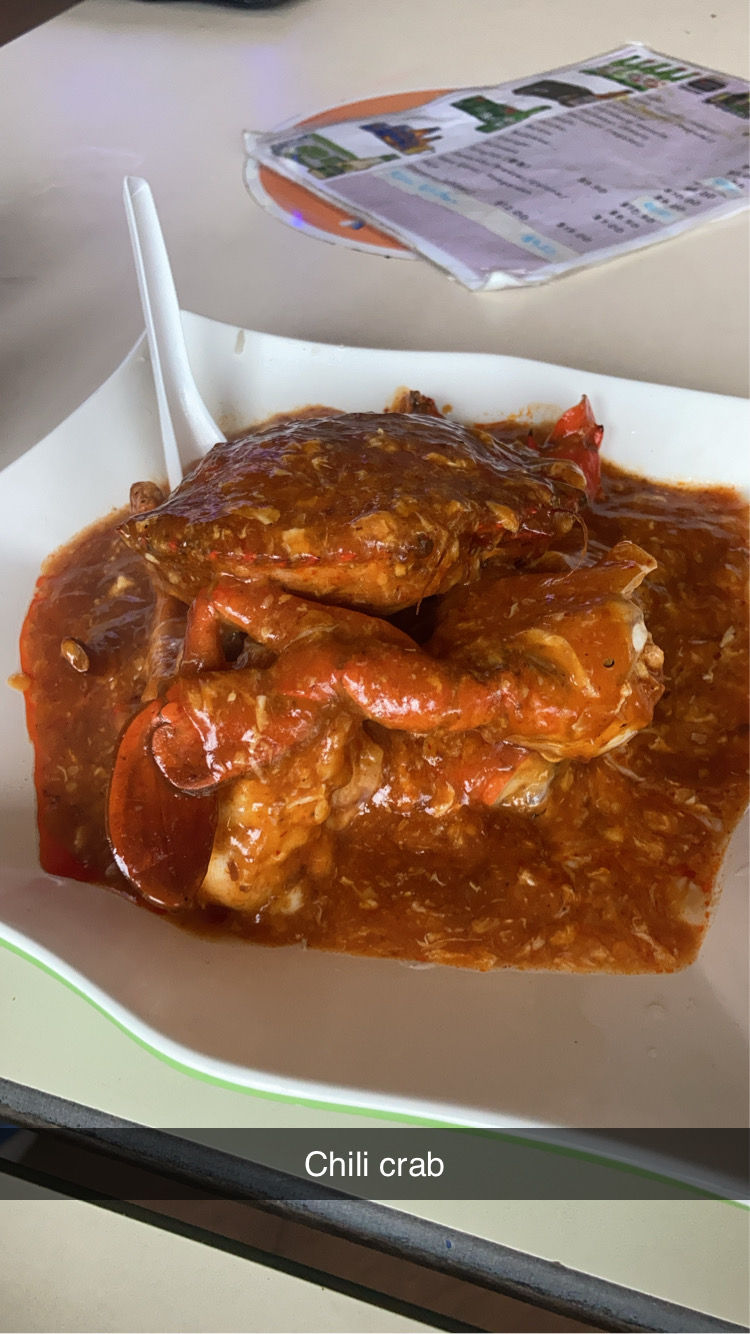
The coolest dining option is the hawker markets. We tried several that each had different vibes, though all were hot, crowded, and a bit chaotic. Hawker markets are a lot to take in, but the reward is well worth it. The food is incredibly affordable – after all, where else can you get Michelin star oyster cakes and chicken rice for less than $5? Hawker markets mean that everyone can disperse, buy something from a different stall, and then pass the plates around the table.
We got to try: BBQ stingray, butter chicken, soup dumplings, and noodles that all marveled our tongues. At the Newton Hawker Market (made famous by Crazy Rich Asians) we also tried the national dish of Singapore: chili crab. Served with the shell absolutely doused in chili sauce, the dish was messy and took some work to get into, but the meat and sauce were both delicious, and mopping the sauce up with mantou buns is the perfect way to end a meal. Finally, the drinks are all tasty and so needed when you’re that hot. Fresh mango and papaya juice, kiwi and Yakult (yogurt drink) juice, and lime lassi (an Indian drink that tastes like a key lime smoothie) were all highlights and the things we miss most now that we’re home.

Outside of hawker markets, Singapore still has much to offer. We went to a sushi bar, a ramen place, and a food hall where we tried laksa – a noodle curry dish that wasn’t too spicy. We also are fans of Din Tai Fung and had to eat there at least once for their world-famous soup dumplings and our favorite chocolate red bean dessert dumplings.
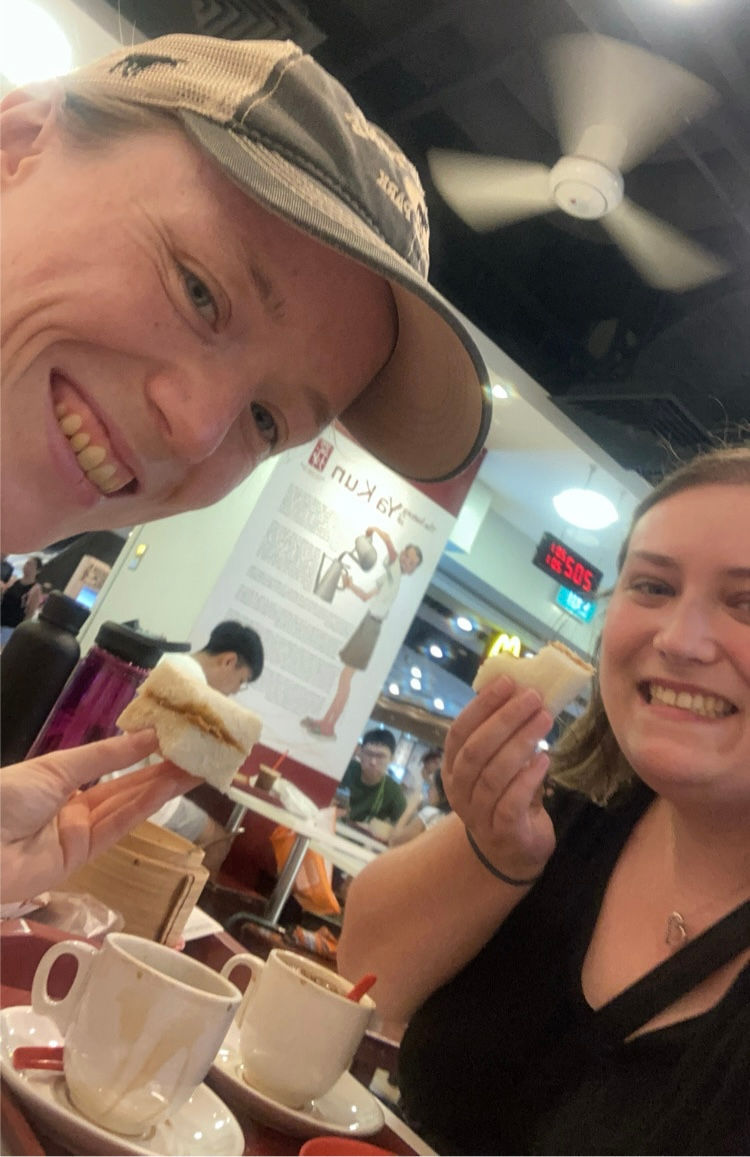
Another staple of Singapore restaurants is the toast restaurant. The most abundant include Ya Kun Kaya Toast and Fun Toast. Singaporeans use the term toast like the British, as in toasties a.k.a. grilled sandwiches. The first time we ordered toast, we somehow managed to order a peanut butter sandwich – albeit on fluffy steamed bread with kaya (coconut) jam – but it was still yummy. There are also abundant bakeries including Bread Talk where we tried various pastries including an apple worm and a pork floss bun. We still aren’t sure what the floss is, but it did look like floss and taste like pork, so well-named at least.

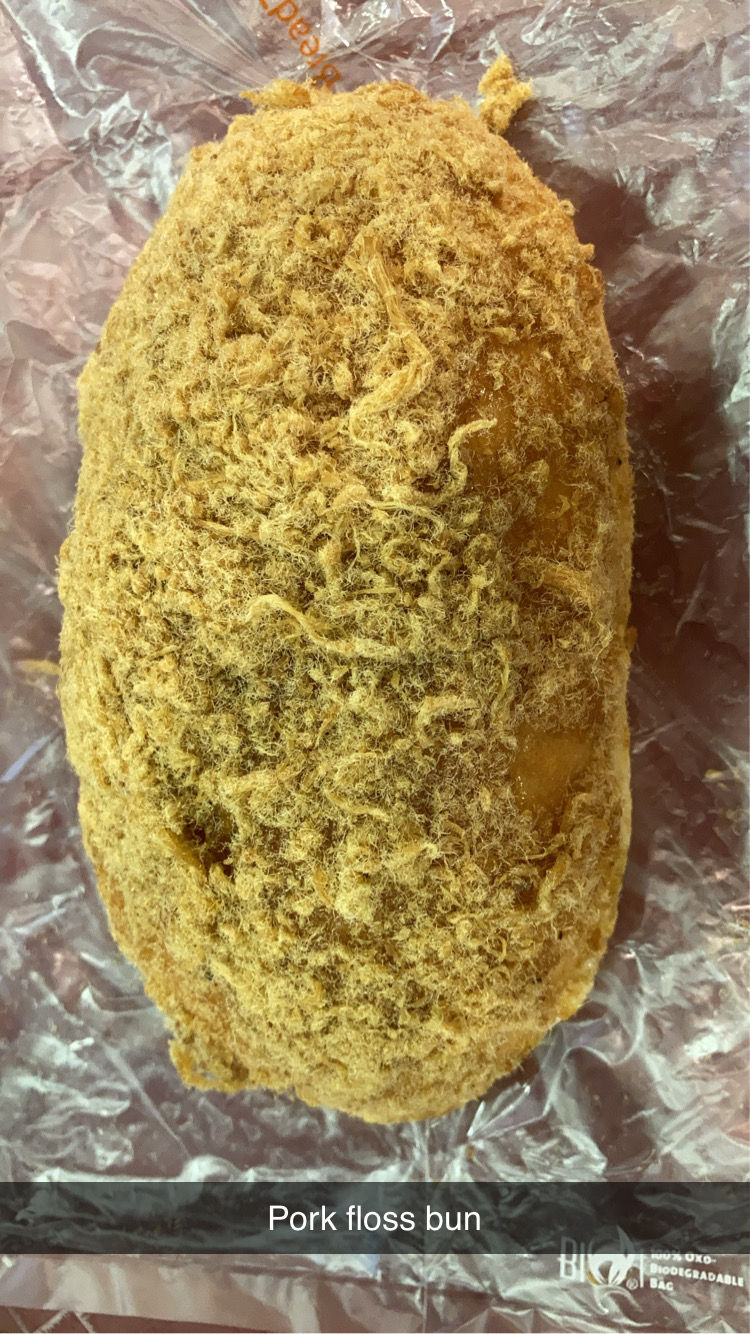
For breakfast most days, we made roti prata, a bread similar to a pita, and super easy to make from frozen just by heating it in a frying pan. You fluff the prata up by smacking it with a spatula. We ate it with scrambled eggs or Nutella and fruit, and we are investigating how to get our hands on some roti prata now that we’re home, hoping we’ll be able to find it at the nearest Asian market.
Finally, the durian of it all. Durian is a whole phenomenon. In the airport, we saw signs asking that passengers alert security if they were transporting durians. On the trains, durians are a prohibited item. When you walk by durian, you know. It stinks! Sounds appealing, right? We wanted to try durian, but it’s hard to transport and we didn’t feel like eating it on the sidewalk, so we found durian ice cream and tried a scoop. Let’s say that we’re glad to have tried it, but we’ll be having s’mores flavor next time. Still, for anyone visiting, you simply gotta taste it.
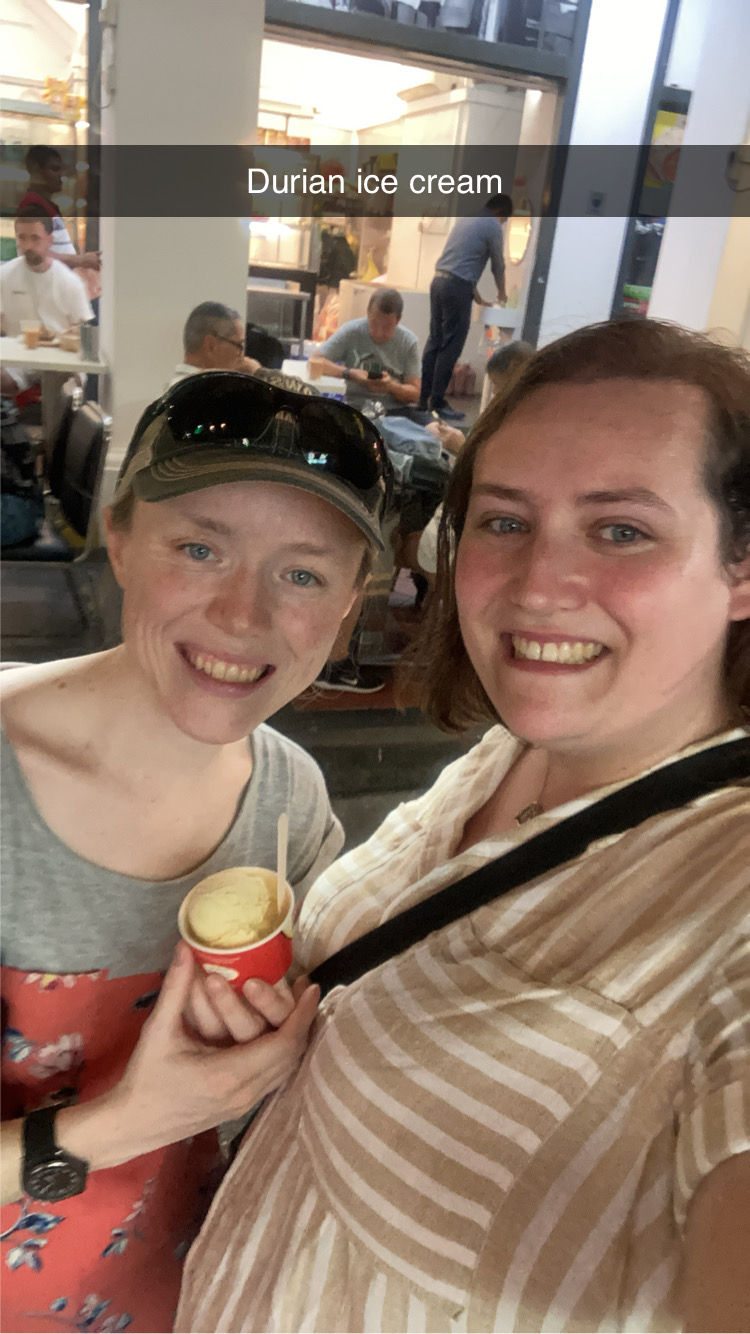
In Our Tourist Era
Of course, we also hit the major tourist attractions that Singapore has to offer:

The Marina Bay Sands Hotel, the iconic triple tower hotel with rooftop infinity pool is THE Singapore image. We only took pictures from the ground and didn’t go up, but we did walk through the lobby and see the very serious security they have going on inside.
The Merlion, a lion/mermaid fountain statue on the bay was a highlight. Formula One was in town when we visited the Merlion so we were treated to the vrooms of racecars as they zipped by just behind us, but the Merlion was chill. It was enjoyable to just watch the water fall, enjoy the misty breeze, and people-watch around the area.

Gardens by the Bay, recently named Trip Advisor’s #8 best attraction in the world, was of course mandatory. We spent one night watching the Supertree music and light show, which was fun, but a bit underwhelming. Still, it’s free and worth the time to see the architecture and enjoy the show. The following day, we visited the two domes – the Flower Dome and Cloud Forest. The former is, you guessed it, full of flowers from around the world. They featured various regions, including California and Australia, with some weird organization of the walking flow that forces you to backtrack. The space was being transitioned out of a Monet exhibit and into a fall harvest theme so we missed the Monet flower design, but we did still get to see the museum part which included some art history exhibits and screen images of some of Monet’s impressionist paintings. We then headed to Cloud Forest featuring a multi-story man-made waterfall, an orchid exhibit, a treetop skywalk, and several exhibits on preserving the environment and the value of nature. To us, the Cloud Forest seemed like a museum that says, “Hey, here’s how beautiful nature can be, now take care of it or else,” and that seems fair. There were some videos at the end that predicted what the planet can become if we all don’t do our part, which admittedly was a bit harrowing, but ultimately, the message is a good one.
As good Swifties, we also had to take a trip to Sentosa Island, the resort destination of Singapore and the place Taylor Swift stays. On the island, they have many resort hotels, Universal Studios, Singapore’s best beaches (still not that good) and the usual tourist fare. We took the cable car, Hello Kitty themed for their concurrent 50th birthdays, from the downtown area over to Sentosa and it was cool to see the island from above and traverse the bay from the sky. The cable car takes you up to Mount Faber, one of the highest points in Singapore, then down to Sentosa Island.
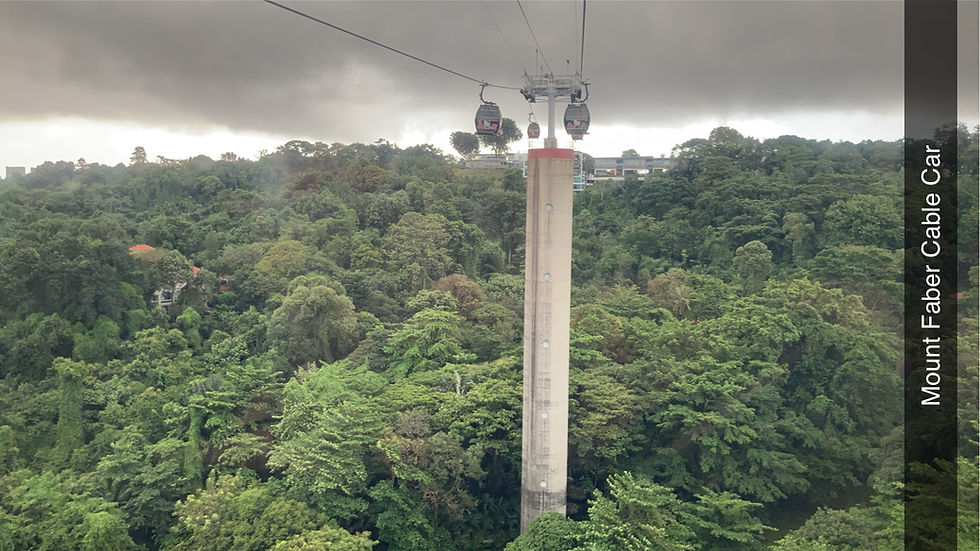
For any Pokémon fans out there, Emily was getting serious Mt. Chimney cable car vibes:
Once on Sentosa, we traveled around the island by train and bus, as the cross-island cable car was closed for maintenance. While it was cool to see, the whole island felt very much like a tourist trap that was devoid of Singapore’s culture and specialness. We walked along the skywalk there and visited Fort Siloso before returning on the cable car.

Finally, no trip is ever complete without a visit to the library. Whitney is a librarian and author (shameless self-plug: her young adult fantasy novel published in 2014), so she is always interested in visiting libraries around the world. The libraries in Singapore are, of course, located in malls. The one we visited is on the top floor of the mall, has an automatic book return just like the libraries we have at home, and has all the usual sections from children’s to teen to adult books, plus areas for magazines, newspapers, and technology. The fun thing about Singapore’s libraries is that they actually have two of every section, as they have each area in both English and Chinese. It’s nice to know that libraries around the world are still familiar while having their own flavor.
Side Quest: Thailand

During our Asia trip, we also went to Phuket, Thailand for a week. During our time in Thailand, we visited the beach every day to bob in the water, took a zipline through the jungle, attempted to visit the Big Buddha statue and temple (it was closed due to a landslide), and visited an elephant sanctuary with retired elephants living their best life. Thailand was super friendly with most people speaking decent English, activities and food being affordable, plus the temperature and humidity is a little lower than Singapore.

Final Thoughts
We are so appreciative of Mom and Dad for hosting us in Singapore for a few weeks (⭐⭐⭐⭐⭐). We had a wonderful time and are eager to visit Asia again – maybe explore Bangkok in Thailand or try Vietnam, Cambodia, Bali, and/or Japan.
Some quick random thoughts to leave you with:
The blending of various cultures and the tolerance of religious practices was cool to see. We saw a lot of various religious dress and most of the food places labeled halal vs. non-halal food for those who need to know. People flow between languages when talking and most signs and announcements are in at least English and Mandarin if not also Malay and Tamil (the four official languages of Singapore).
The stores and people who play music without headphones were mostly playing music we recognized, a lot of American pop music. People really seem to love Justin Bieber for some reason. Emily found it very poetic when we walked out on a pier to look across the water to Malaysia (the city of Johor Bahru, known by the locals as J.B.) and a young couple was listening to Justin Bieber (also known as J.B. of course).
We brought umbrellas and used them for rain occasionally, but quickly adopted the local practice of using them for shade to keep off the sunburn. It worked brilliantly.
We bought Crocs to wear during our trip and it was the best purchase! Crocs are very popular in Singapore and we saw many, young and old, wearing them. They’re comfortable on both city pavement and nature trails, waterproof for when it’s raining, and easy to clean if they get muddy or dusty. We highly recommend them if you’re headed to Southeast Asia.
For public transportation enthusiasts, here's a cool video from one of Sean and Vivian's YSA friends on the past and future development of the MRT (train system):
It took us 50 hours door-to-door to get home, so now our arms are really, really tired, but every arm flap was worth it.
Okay-lah (Singlish for "whatever"),
Emily and Whitney


Thanks for sharing some detailed observations. Amongst many, I was struck by the idea of no AC in the toilet, of a fresh orange juice machine, and macaques roaming free. Fifty hour return journey - No Thanks, Ouch 😰!
What a great visit! That was so fun to read about. I want to try the orange juice vending machines!
Super report. Thanks for taking the time for writing all of this. I served my mission in Indonesia, spent time in Singapore as a missionary, then visited Singapore twice during my career. I love the place.
Excellent writing, account, and visit.